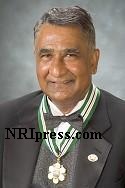| Punjabi
Language Education Association: |
|
 |
India is celebrating its 58th Republic Day
Richmond, BC, Canada, Jan 26, 2007
Balwant Sanghera
This month, India is celebrating its 58th Republic Day. It is
the day when this nation became a republic and adopted its constitution.
This largest democracy in the world has come a long way since
it became a republic on January 26, 1950. Occasions like these
offer good opportunity to reflect upon the progress or lack thereof.
During the past few years, India has become a rising star on the
international stage. In addition to its strong economy, India
has also been fairly successful as one of the most multicultural
and multilingual countries in the world. Its rich past and bright
future is a matter of great pride for Indians.
Historically, India has contributed a lot to the growth and development
of civilization. Famous scientist and father of the theory of
relativity, Albert Einstein, once remarked, “We owe a lot
to the Indians who taught us how to count, without which no worthwhile
scientific discovery could have been made”
Einstein’s comments were echoed by prominent writer Mark
Twain in these words: “India is the cradle of the human
race, the mother of history, the grandmother of legend and the
great grandmother of tradition. Our most valuable and most instructive
materials in the history of man are treasured up in India only.”
In addition to being one of the world largest, oldest, continuous
civilizations, India has the unique distinction of being the home
of the world’s first university. It was established in Takshashila
in 700 BC. More than 10,000 students from all over the world studied
more than 60 subjects there. The University of Nalanda, built
in the 4th century B.C. was one of the greatest achievements of
ancient India in the field of education.
According to the available information, the art of Navigation
was born in the river Sindhu 6,000 years ago. The very word Navigation
is derived from the Sanskrit word NAVGATIH.
The number system, chess, algebra, trigonometry and calculus are
also India’s contribution to the world. India gave the world
Ayurveda, the earliest school of medicine known to humans, more
than 2,500 years ago.
The four religions born in India - Hinduism, Budhism, Jainism
and Sikhism - are followed by 25% of the world population.
These are only a few of the things that India has given to the
world. Even in modern times, this nation of more than one billion
people is excelling in many areas. Despite chronic problems like
poverty, corruption and religious conflicts, India has been making
impressive progress nearly in very aspect.
India has the second largest pool of scientists and engineers
in the world. It is the largest English speaking nation in the
world. India is the only country other than the U.S. and Japan,
to have built a super computer indigenously.
Happy 58th Republic Day, India!

|
| |
|
|
| |
|

Balwant Sanghera
President, Punjabi Language Education Association . He is a retired
School Psychologist and Community Activist in British Columbia ,Canada.
|
|